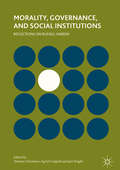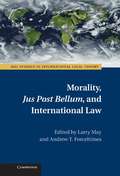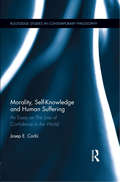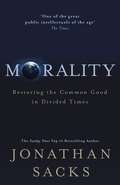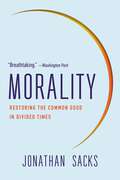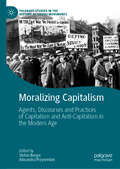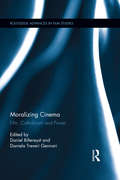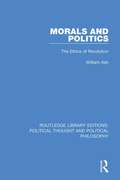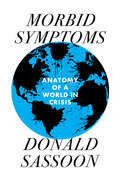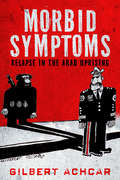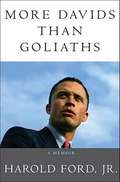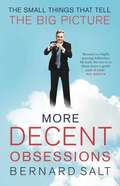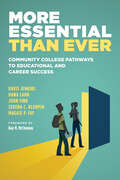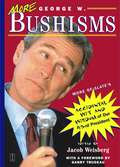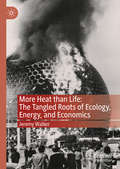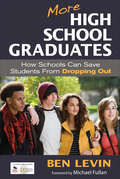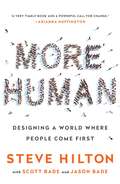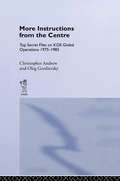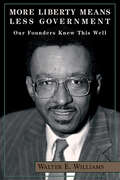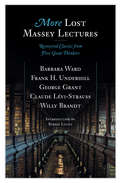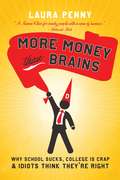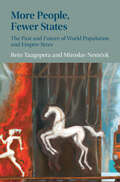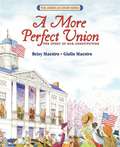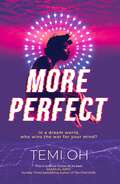- Table View
- List View
Morality, Governance, and Social Institutions
by Jack Knight Thomas Christiano Ingrid CreppellThis book reflects on the research and career of political theorist Russell Hardin from scholars of Political Science, Philosophy, Sociology, Economics, and Law, among other disciplines. Contributions address core issues of political theory as perceived by Hardin, starting with his insistence that many of the basic institutions of modern society and their formative historical beginnings can be understood as proceeding primarily from the self-interested motives of the participants. Many of the contributions in this volume struggle with the constraints imposed on political theorizing by the idea of self-interested agents, or homo economicus. Some reject the idea as empirically unfounded. Others try to show that homo economicus is even more versatile than Hardin depicts. And yet others accept the constraints and work within them. But all pay tribute to the lasting intellectual contribution of Russell Hardin and the challenge he poses. The book should appeal to scholars and students interested in collective action, public choice and democracy, moral reasoning and its limits, constitutionalism, liberalism, conventions and coordination, trust, identity politics, social epistemology, and methods in politics philosophy.
Morality, Jus Post Bellum, and International Law
by Larry May Andrew T. ForcehimesThis collection of essays brings together some of the leading legal, political and moral theorists to discuss the normative issues that arise when war concludes and when a society strives to regain peace. In the transition from war, mass atrocity or a repressive regime, how should we regard the idea of democracy and human rights? Should regimes be toppled unless they are democratic or is it sufficient that these regimes are less repressive than before? Are there moral reasons for thinking that soldiers should be relieved of responsibility so as to advance the goal of peace building? And how should we regard the often conflicting goals of telling the truth about what occurred in the past and allowing individuals to have their day in court? These questions and more are analyzed in detail. It also explores whether jus post bellum itself should be a distinct field of inquiry.
Morality, Self Knowledge and Human Suffering: An Essay on The Loss of Confidence in the World (Routledge Studies in Contemporary Philosophy)
by Josep CorbíIn this wholly original study, Josep Corbi asks how one should relate to a certain kind of human suffering, namely, the harm that people cause one another. Relying upon real life examples of human suffering--including torture, genocide, and warfare--as opposed to thought experiments, Corbi proposes a novel approach to self-knowledge that runs counter to standard Kantian approaches to morality.
Morality: Restoring the Common Good in Divided Times
by Jonathan SacksWe are living through a period of cultural climate change. We have outsourced morality to the markets on the one hand, and the state on the other. The markets have brought wealth to many, and the state has done much to contain the worst excesses of inequality, but neither is capable of bearing the moral weight of showing us how to live. This has had a profound impact on society and the way in which we interact with each other. Traditional values no longer hold, yet recent political swings show that modern ideals of tolerance have left many feeling rudderless and adrift. In this environment we see things fall apart in unexpected ways - toxic public discourse makes true societal progress almost unattainable, a more divisive society is fuelled by identity politics and extremism, and the rise of a victimhood mentality calls for 'safe spaces' but stifles debate. The influence of social media seems all-pervading and the breakdown of the family is only one result of the loss of social capital. Many fear what the future may hold.Delivering a devastatingly insightful critique of our modern condition, and assessing its roots and causes from the ancient Greeks through the Reformation and Enlightenment to the present day, Sacks argues that there is no liberty without morality, and no freedom without responsibility.If we care about the future of western civilisation, all of us must play our part in rebuilding our common moral foundation. Then we will discover afresh the life-transforming and counterintuitive truths that a nation is strong when it cares for the weak, and rich when it cares for the poor.Here is an inspiring vision of a world in which we can all find our place, and face the future without fear.
Morality: Restoring the Common Good in Divided Times
by Jonathan SacksA distinguished religious leader's stirring case for reconstructing a shared framework of virtues and values. With liberal democracy embattled, public discourse grown toxic, family life breaking down, and drug abuse and depression on the rise, many fear what the future holds. In Morality, respected faith leader and public intellectual Jonathan Sacks traces today's crisis to our loss of a strong, shared moral code and our elevation of self-interest over the common good. We have outsourced morality to the market and the state, but neither is capable of showing us how to live. Sacks leads readers from ancient Greece to the Enlightenment to the present day to show that there is no liberty without morality and no freedom without responsibility, arguing that we must all must play our part in rebuilding a common moral foundation. A major work of moral philosophy, Morality is an inspiring vision of a world in which we can all find our place and face the future without fear.
Moralizing Capitalism: Agents, Discourses and Practices of Capitalism and Anti-Capitalism in the Modern Age (Palgrave Studies in the History of Social Movements)
by Stefan Berger Alexandra PrzyrembelThis book adds a crucial focus on morality to the growing literature on the history of capitalism by exploring social and cultural perspectives on the economic order that has dominated the modern world. Taking the study beyond narrow economic confines, it traces the entanglement between moral sentiments and capitalism, examining both moral critiques and moral justifications. Company bankruptcies, systems of taxation, wealth, and the running of stock exchanges were attacked on moral grounds, while ideas of economic justice and the humanization of capitalism loomed large over moral critiques. Many movements, from antislavery to labour campaigns, were inspired by aspirations to improve capitalism and halt the moral decay that was felt to have affected large sections of society. This book questions how moral sentiments are defined and have changed over time, and how these relate to both capitalism and anti-capitalism. Covering a range of different social movements and ethical issues, the 13 chapters present a moral history of capitalism, understood not simply as an economic system but as an order that encompasses all areas of modern life.
Moralizing Cinema: Film, Catholicism, and Power (Routledge Advances in Film Studies)
by Daniel Biltereyst Daniela Treveri GennariThis volume is part of the recent interest in the study of religion and popular media culture (cinema in particular), but it strongly differs from most of this work in this maturing discipline. Contrary to most other edited volumes and monographs on film and religion, Moralizing Cinema will not focus upon films (cf. the representation of biblical figures, religious themes in films, the fidelity question in movies), but rather look beyond the film text, content or aesthetics, by concentrating on the cinema-related actions, strategies and policies developed by the Catholic Church and Catholic organizations in order to influence cinema. Whereas the key role of Catholics in cinema has been well studied in the USA (cf. literature on the Legion of Decency and on the Catholic influenced Production Code Administration), the issue remains unexplored for other parts of the world. The book includes case studies on Argentina, Belgium, France, Ireland, Italy, Luxemburg, the Netherlands, and the USA.
Morals and Politics: The Ethics of Revolution (Routledge Library Editions: Political Thought and Political Philosophy #2)
by William AshFirst published in 1977. Ethics is the most practical branch of philosophy: its immediate concern is with people's actions. Yet most philosophers do little to relate ethics intelligibly to the human situation. In this inquiry into the nature of ethics, William Ash draws on the relevant works of Marx, Engels, Lenin and Stalin to present the theory and practice of Marxist ethics. He offers an explanation of the moral aspect of Marx's dictum: 'The philosophers have only interpreted the world, in various ways; the point, however, is to change it.‘ The book includes, perhaps for the first time in so considered a form, an assessment of Mao Tsetung's contribution to Marxist moral philosophy, together with the ethical implications of such developments in social practice as the Proletarian Cultural Revolution. The author deals with the question of value by analysing the concept of 'good'; with the question of claims on people and things by analysing the concept of 'right'; with the question of the limits and scope of freedom of choice and action by analysing the concept of 'ought'.’ Clearly written in order to 'de-mystify' the subject, the book challenges readers to test the author's enlightened, Marxist approach in terms of the ethical ordering of their own society.
Morbid Symptoms: An Anatomy of a World in Crisis
by Donald SassoonA health check on our corrupt and broken political system by one of our finest historiansThe deadly coronavirus spread across societies already riddled with political ills: rampant xenophobia and corruption, privatisation run amok, Brexiteer vainglory of 'a global Britain', a Euroland dominated by self-proclaimed nasty parties, and in America, the unspeakable Trump. As the acclaimed historian Donald Sassoon observes in this blistering polemic, there were morbid symptoms galore.Sassoon paints an unforgettable picture of our galloping descent into political barbarism, mixing blunt exposé and classical references with an astonishing array of data. Why does the United States proportionately have more civilians owning guns than Yemen, where there is a war on? Why did the UK enter the pandemic with fewer doctors than any EU country except Poland and Romania?In Morbid Symptoms he refuses to abandon what Antonio Gramsci termed the optimism of the will, instead recalling a line from Machiavelli's Istorie fiorentine: 'do not impute past disorders to the nature of the men, but to the times, which, being changed, give reasonable ground to hope that, with better government, our city will have better fortune in the future'.
Morbid Symptoms: Relapse in the Arab Uprising
by Gilbert AchcarSince the first wave of uprisings in 2011, the euphoria of the "Arab Spring" has given way to the gloom of backlash and a descent into mayhem and war. The revolution has been overwhelmed by clashes between rival counter-revolutionary forces: resilient old regimes on the one hand and Islamic fundamentalist contenders on the other. In this eagerly awaited book, foremost Arab world and international affairs specialist Gilbert Achcar analyzes the factors of the regional relapse. Focusing on Syria and Egypt, Achcar assesses the present stage of the uprising and the main obstacles, both regional and international, that prevent any resolution. In Syria, the regime's brutality has fostered the rise of jihadist forces, among which the so-called Islamic State emerged as the most ruthless and powerful. In Egypt, the Muslim Brotherhood's year in power was ultimately terminated by the contradictory conjunction of a second revolutionary wave and a bloody reactionary coup. Events in Syria and Egypt offer salient examples of a pattern of events happening across the Middle East. Morbid Symptoms offers a timely analysis of the ongoing Arab uprising that will engage experts and general readers alike. Drawing on a unique combination of scholarly and political knowledge of the Arab region, Achcar argues that, short of radical social change, the region will not reach stability any time soon.
More Davids Than Goliaths: A Political Education
by Harold Ford Jr.Harold Ford Jr. has long distinguished himself as a charismatic, results-oriented politician with fresh ideas. His career began at age 26 after he won his father's Congressional seat, serving his Tennessee district for ten years. He stepped into the national spotlight with his electric keynote at the 2000 Democratic National Convention, and in 2006 his reputation was further shaped during the closest Senate race in Tennessee's history, which he lost. Ford feels passionately that our country's best da...
More Decent Obsessions: The Small Things That Tell the Big Picture
by Bernard SaltHave you ever become engrossed in a trashy magazine at the dentist, only to realise that it is a decade old?Why do 'mates rates' always favour the buyer and never the seller?Have you noticed the new trends in the language of cafe menus?Over the years Salt has charmed Australian readers with his unique blend of social insight and down-to-earth observations.In More Decent Obsessions Salt channels our innermost thoughts and helps us understand ourselves a little bit better. If not Salt, then who else would tell the Australian people the truth about the Goat's Cheese Curtain, ticket etiquette at the deli counter or how to navigate the introduction of the unisex loo?Join Bernard Salt on a playful yet insightful journey that takes us forward to the 2030s and back to the 1960s examining life, manners and more to sketch a bigger picture of modern life in Australia.'Bernard is a highly amusing bellwether. He leads the rest of us sheep down a gentle path of truth.' - Ray Martin
More Essential Than Ever: Community College Pathways to Educational and Career Success
by Davis Jenkins Hana Lahr John Fink Serena C. Klempin Maggie P. FayAn evidence-based approach to community college transformation featuring innovative practices that strengthen offerings and foster student success
More Freedom, Less Terror?
by Frederic Wehrey Dalia Dassa Kaye Audra K. Grant Dale StahlA key tenet of U.S. foreign policy has been that promoting democracy reduces terrorism; however, scant empirical evidence links democracy to terrorism, positively or negatively. This study explores the relationship between the two by examining the effects of liberalization processes on political violence in six Arab cases.
More George W. Bushisms
by Jacob Weisberg"Most of you probably didn't know that I have a new book out. Some guy put together a collection of my wit and wisdom -- or, as he calls it, my accidental wit and wisdom. [Laughter]But I'm kind of proud that my words are already in book form. "-- President George W. Bush,discussing and reading fromGeorge W. BushismsBy now, most of you probably do know aboutGeorge W. Bushisms,the bestselling collection of misstatements made on the campaign trail by our president. Now, inMore George W. Bushisms,Jacob Weisberg reveals that the malapropisms didn't stop on Inauguration Day:"I've coined new words likemisunderstandingandHispanically. ""I haven't had a chance to talk, but I'm confident we'll get a bill that I can live with if we don't. ""Our nation must come together to unite. ""There's no question that the minute I got elected, the storm clouds on the horizon were getting nearly directly overhead. "These and many other presidential pearls are hilariously on display inMore George W. Bushisms.
More Heat than Life: The Tangled Roots of Ecology, Energy, and Economics
by Jeremy WalkerThis book traces the interacting histories of the disciplines of ecology and economics, from their common origin in the ancient Greek concept of oikonomia, through their distinct encounters with energy physics, to the current obstruction of neoliberal economics to responses to the ecological and climate crisis of the so-called Anthropocene. Reconstructing their constitution as separate sciences in the era of fossil-fuelled industrial capitalism, the book offers an explanation of how the ecological sciences have moved from a position of critical collision with mainstream economics in the 1970s, to one of collusion with the project of permanent growth, in and through the thermal crisis of the biosphere.
More High School Graduates: How Schools Can Save Students From Dropping Out
by Benjamin LevinA proven system to boost high school graduation rates This guide helps school leaders and government policymakers boost high school graduation rates. Drawing from his knowledge as an education official and professor, author Ben Levin presents a system to turn around secondary schools that is adaptable for local-, district-, and state-level decision making. Components include: Keeping track of all students’ progress and intervening early to prevent failure Establishing curriculum and graduation requirements that support increased student success Improving teaching and learning Connecting with the community to engage families, local businesses, and other stakeholders in improving graduation rates Implementing methods for planning, communicating, and winning support
More Human: Designing A World Where People Come First
by Steve Hilton Scott Bade Jason BadePeople feel angry and let down by their leaders, as well as by the institutions that dominate their lives: political parties, government bureaucracy, and corporations. Yet the cause of this malaise, according to political-advisor-turned-tech-CEO Steve Hilton, is not being addressed by politicians on the left or the right. Hilton argues that much of our daily experience--from the food we eat, to the governments we elect, to the economy on which our wealth depends, to the way we care for our health and well-being--has become too big, too bureaucratic, and too distant from the human scale. More Human sets out a radical manifesto for change, aimed at the root causes of our problems rather than just the symptoms. Whether it’s using the latest advances in neuroscience to inform the fight against poverty and inequality, or applying lessons from America’s most radical schools to transform our children’s education, this book is an agenda for rethinking and redesigning the outdated systems and structures of our politics, government, economy, and society to make them more suited to the way we want to live our lives today. To make them more human.
More Instructions from the Centre: Top Secret Files on KGB Global Operations 1975-1985
by Christopher Andrew Oleg GordievskyDuring the decade that preceded Mr Gorbachev's era of glasnost and perestroika, the KGB headquarters in Moscow was putting out a constant stream of instructions to its Residencies abroad. Unknown to the KGB, however, many of these highly classified documents were being secretly copied by Oleg Gordievsky, at that time not only a high-ranking KGB officer based in London but also a long-serving undercover agent for the British. The selected documents in this volume, translated and analysed by the editors with a commentary by Christopher Andrew to set them in context, offer a revealing insight into the attitudes, prejudices and fears of the KGB during what were to prove its declining years.
More Liberty Means Less Government: Our Founders Knew This Well
by Walter E. WilliamsIn this collection of thoughtful, hard-hitting essays, Walter E. Williams once again takes on the left wing's most sacred cows with provocative insights, brutal candor, and an uncompromising reverence for personal liberty and the principles laid out in our Declaration of Independence and Constitution.
More Lost Massey Lectures: Recovered Classics from Five Great Thinkers (The CBC Massey Lectures)
by Claude Levi-Strauss George Grant Willy Brandt Frank Underhill Barbara WardThe CBC Massey Lectures, Canada's preeminent public lecture series, are for many of us a highly anticipated annual feast of ideas. However, some of the finest lectures, by some of the greatest minds of modern times, have been lost for many years -- unavailable to the public in any form. This is the second volume of recovered lectures, a follow-on to The Lost Massey Lectures, and features: Nobel Peace Prize recipient Willy Brandt on the dangerous inequities between developing and industrialized nations in Dangers and Options: The Matter of World Survival; George Grant on the worsening predicament of the West through an examination of the thought of Friedrich Nietzsche in Time as History; Claude Levi-Strauss on the nature and role of myth in human history in Myth and Meaning; Frank Underhill on the deficiencies of the Canadian constitution in The Image of Confederation; and Barbara Ward, in the very first Massey Lecture, on the origin and predicament of underdeveloped countries in The Rich Nations and the Poor Nations. More Lost Massey Lectures includes an introduction by Bernie Lucht, who has been the executive producer of CBC Radio's Ideas and the Massey Lectures since 1984.
More Money Than Brains: Why School Sucks, College is Crap, & Idiot Think They're Right
by Laura PennyOne of Canada's funniest and most incisive social critics reveals why in North America, where governments spend so much on schools and colleges, training is valued far more than education and loud-mouth ignoramuses are widely and publicly celebrated.Public education in the United States is in such pitiful shape, the president wants to replace it. Test results from Canadian public schools indicate that Canadian students are at least better at taking tests than their American cousins. On both sides of the border, education is rapidly giving way to job training, and learning how to think for yourself and for the sake of dipping into the vast ocean of human knowledge is going distinctly out of fashion.It gets worse, says Laura Penny, university lecturer and scathingly funny writer. Paradoxically, in the two nations that have among the best universities, libraries, and research institutions in the world, intellectuals are largely distrusted and yelping ignoramuses now clog the arenas of public discourse.A brilliant defence of the humanities and social sciences, More Money Than Brains takes a deadly and extremely funny aim at those who would dumb us down.From the Hardcover edition.
More People, Fewer States: The Past and Future of World Population and Empire Sizes
by Rein Taagepera Miroslav NemčokThe long-term development of political systems over extended time periods has been somewhat neglected. More People, Fewer States examines world history through population explosion and empire size changes across 5000 years of socio-technological development, revealing three distinct phases: Runner, Rider, and Engineer empires. A careful comparative approach reveals that Old Egypt, Achaemenid, Caliphate, Mongol, and Britain each achieved remarkable yet rarely acknowledged expansions, leading to their successive record empire sizes. If identified past trends persist, a potential single world state could emerge by 4600, although environmental concerns may intervene. Focusing on population dynamics and area metrics of states, this book provides a novel framework for evaluating the growth, structure, and decline of empires. It not only illuminates ancient historical space but also ventures into future projections, making it an essential read for scholars interested in the long-term evolution of political systems.
More Perfect Union: The Story of Our Constitution
by Giulio Maestro Betsy MaestroThis easy-to-understand book tells why and how the Constitution of the United States was created. "Simple, attractive, informative. . . . The most accessible history of the Constitution to date. "--School Library Journal.
More Perfect: The Circle meets Inception in this moving exploration of tech and connection.
by Temi Oh"What does it feel like to wake up in the Panopticon? It&’s like waking up for the first time ever. It&’s like waking up with a third eye." When Moremi connects her brain to the Panopticon, a network which allows you to see inside the minds and dreams of others, she believes that it will save her from depression, loneliness and, eventually, death. That is until she meets Orpheus. Orpheus was brought up in isolation by a Neo-luddite father. He was raised to question everything, including the government who plan to make the connection procedure compulsory. They promise that connecting everyone to the Panopticon will end human suffering and usher in a more perfect world. But when Orpheus and Moremi uncover the dark side of the technology, they find themselves on opposite sides of a radical divide, between those who believe that the Panopticon will save humanity, and those who will stop at nothing to destroy it. The Circle meets Inception in an immersive and futuristic story that explores love, loneliness and the limits of technology&’s ability to save a humanity who might not want to be saved.
